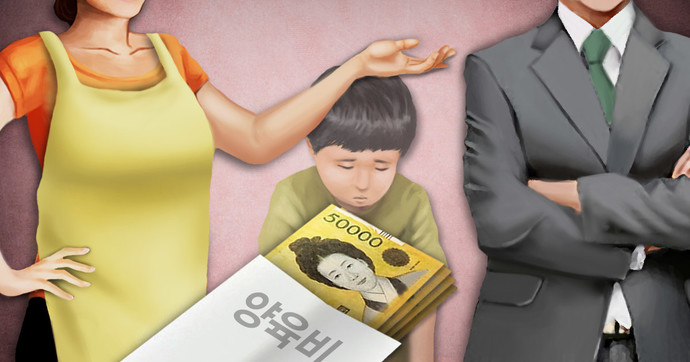[다문화뉴스] Q&A: 이혼한 배우자가 양육비를 주지 않는다면 어떻게 해결해야 할까?

[Multi-culture News] Q&A: Conflict about child support expense between divorced couple
In general, when a couple with children divorces, conflicts regarding custody and child support are bound to arise. If both spouses can become financially independent or if the primary caregiver can raise children without the help of a non-custodial parent, the extent of the conflict may be insignificant. Conflicts over child support payments are inevitable if one of the divorced couples has no economic capacity. According to the statistics reported by the Ministry of Gender Equality and Family, 6 out of 10 non-custodial parents did not pay child support properly after divorce. Counseling related to non-payment of child support amounts to an average of 30,000 cases per year.
Conflicts over child support are more pronounced in divorced multicultural couples. Especially in the case of married immigrants, it is not easy to achieve economic independence due to language problems, so even after divorce, they sometimes depend on their Korean spouses financially for child-rearing. If the Korean spouse does not pay child support in a timely manner, the right to live of the child as well as herself or himself is seriously threatened.
Just as each divorced family has its own reasons, disputes over child support payments also show various aspects due to the complicated interests and circumstances of the people involved. In this article, we assume various cases and situations related to child support payment and claim litigation when not only Korean couples but also multicultural couples(when a Korean spouse and a foreign spouse are married) divorce, and satisfy the curiosity through a Q&A with a lawyer Min-hye Koo specializing in divorce cases.

Q&A with the lawyer Min-Hye Koo below.
Q. Please explain the general procedure for filing a child support claim
A. In the event of a divorce, whether through a judicial divorce or a divorce by agreement, if the couple has minor children, the child's custody and custodian are designated. At this point, the monthly child support payment that a non-custodial parent should pay to the primary caregiver until the minor child reaches the age of majority is set.
If the non-custodial parent does not pay child support to the primary caregiver, even though issues related to child support were agreed upon at the time of the divorce, the primary caregiver may file a 'request for a child support order adjudication(written as 양육비이행명령심판청구 in Korean)' to the court and force
In addition, when the noncustodial parent does not continue to pay child support, if the noncustodial parent is a business owner and owns a certain level of the property, the primary caretaker can file a 'guarantee order' against the noncustodial child.
If the non-custodial parent is an employee, the child-caregiver may apply for a ‘direct child support payment order’ that requires the employer of the company where the non-custodial child works to pay a portion of the non-custodial salary directly to the child caregiver.
Nevertheless, the court has issued an order to comply with the above, but the non-custodial child continues to ignore it and does not pay, he or she may be subject to a fine of not more than 10 million won or imprisonment for up to 30 days.
Q. Is the child support lawsuit between a foreign spouse and a Korean spouse different from a lawsuit between a Korean spouse?
A. No. If you are divorced according to the procedures of the Korean court and your child has Korean citizenship, the child support lawsuit is the same as that of a Korean, even if you are a foreigner.
Q. Are childcare costs borne by both parents regardless of financial ability?
A. Parents have a duty to raise their children, regardless of their economic circumstances. Even if one of them is not financially capable, they must pay child support at a minimum level.
Q. If divorced parents are raising children separately, how do they divide child support?
A. If one of the divorced parents raises all children, the non-custodial parent must pay the agreed-upon child support. However, in exceptional cases, when parents raise their children respectively, the parent with the lowest cost pays a certain level of child support to the parent with the higher cost, taking into account the age of the minor child. However, parents often agree not to pay child support to each other if there is no significant difference in child support costs for education or living expenses due to the similar age of the children.

Q&A for the primary caregiver
Q. Time has passed since the divorce and the child has already become an adult. the child-caregiver has never asked for child support and never received it. It is possible for the primary caregiver to file a child support claim with the non-custody parent?
A. At the time of divorce, if the couple set the cost of child support, the primary caregiver can calculate the child support that has not been received and claim it to the non-custodial parent. Even if a couple has not decided on child support at the time of divorce, the primary caregiver can calculate the cost of child support and claim it based on the non-custody parent's salary level.
Q. At the time of the divorce, the couple agreed that the non-custodial parent would pay the primary caregiver a fixed amount each month as child support. However, when the primary caregiver checked the child support calculation table, the amount of child support payment agreed upon by the couple was less than the standard of the calculation table. Can the primary caregiver receive additional child support from the non-custodial parent?
A. Since child support is not subject to the effect of excluding further litigation, The primary caregiver may request a trial to increase child support to the non-custodial parent on the grounds of a change in circumstances such as the child's education.
Q. Does the maximum child support the primary caregiver can receive vary depending on the job or salary of the divorced spouse?
A. The amount of child support the primary caregiver can receive is calculated by referring to the child support calculation criteria while considering the divorced spouse's job and financial ability such as annual salary. If the divorced spouse's income is high, the child support the primary caregiver can receive increases.
Q. When the divorced spouse who was paying child support dies, can the primary caregiver claim child support from the divorced spouse's parents?
A. In principle, child support is borne by the parents who are responsible for raising their children. If the non-custodial parent dies, the primary caregiver is solely responsible for the care of the minor child. The non-custodial parent’s parents have no liability to bring up their grandchildren. Therefore, if the noncustodial parent dies, the primary caregiver cannot claim child support from the noncustodial parent’s parents.
Q. When divorced, the primary caregiver agreed not to receive child support. However, the current economic situation is not favorable, so he/she is going to ask the divorced spouse for child support. Can the child-caregiver get child support from the divorced spouse?
A. Since child support is not subject to the effect of excluding further litigation, even if they agreed not to receive child support at the time of divorce, they can file a request for a trial to change child support due to the change in circumstances that worsened the parent's economic situation.
Q. Is there any way to receive child support at once?
A. In principle, child support is paid every month until the child is mature. However, a lump-sum payment can be obtained by mutual agreement between the divorced parties. When child support is paid in a lump sum, child support is often reduced.
Q. If the divorced spouse does not pay child support, can the non-custody parent receive child support by seizing the spouse's salary account?
A. If the non-custodial parent does not pay child support, the child-caregiver can determine and enforce the unpaid child support through a request for adjudication on child support enforcement orders. Of course, you can collect the non-custodial payroll by confiscation.
Q. When a divorced foreign spouse left Korea, what should the Korean spouse do to receive child support from the foreign spouse?
A. A child caregiver can file a child support enforcement order adjudication request against a non-custodial child for overdue child support. If the non-custodial parent has property in Korea, the custodian may enforce the property in Korea on the basis of the established enforcement authority. However, in fact, if the non-custodial parent resides in a foreign country, it is difficult to ascertain the whereabouts of the non-custodial parent and to verify the property details of him/her.
Q&A for the non-custody parents
Q. If the primary caregiver who was raising the child after divorce remarries, does the non-custody parent have to pay child support as it is?
A. Child support for a minor child is paid as a parent. Even if the primary caregiver remarries, the fact remains that the non-custodial parent is the parent of the child, so child support must be paid. However, if the primary caregiver who remarries agrees not to pay child support, the non-custodial parent does not need to pay it.
Q. At the time of the divorce, the non-custodial parent was paying the agreed child support every month, but he/she realized that the primary caregiver was using the child support for doing something not raising the child. Can the non-custodial parent force it to be used only on children?
A. In fact, the reality is that the child support paid by the non-custodial parent cannot cover all the expenses necessary for the child-rearing. Also, there is no way to check each child support and force it to be spent only on the children.
However, if the child-caregiver has used the child support sent by the non-custodial parent for other purposes and the non-custody parent has become aware of the circumstances in which the child-rearing is significantly neglected, the non-custodial parent can file a request for a trial to change the designation of the child in the court and bring the child with custody.
After the divorce, the foreign spouse who is mainly rearing the child returned to his/her home country with the child. Do non-custodial parent has to pay child support every month?
In principle, since the fact remains that the non-custodial parent is the parent of the child, they should pay child support. However, it is true that they are reluctant to pay child support unconditionally if it is difficult to confirm that the child is being raised properly and interview negotiations are difficult. In this case, the non-custodial parent can ask the caregiver to discuss the method of payment of child support and interview negotiations.
Q. Do I have to pay in cash when paying child support? Can I pay child support by transferring real estate or stock?
A. In principle, child support should be paid in cash every month. However, the child support can be transferred in real estate or stocks instead of cash by agreement between the couple. This is possible only with an agreement between the parties.
By Seyong Lee
[다문화뉴스] Q&A: 이혼한 배우자가 양육비를 주지 않는다면 어떻게 해결해야 할까?
일반적으로 아이가 있는 부부가 이혼하게 되면 양육권과 양육비에 관련한 갈등은 불거지게 마련이다. 부부가 모두 경제적으로 자립할 수 있거나 주양육자가 비양육자의 도움 없이도 아이들을 양육할 수 있다면 그 갈등 정도는 미미할 수 있겠으나, 양 배우자 중 한 쪽이라도 경제적 자립을 담보하지 못하는 경우라면 이혼 시 양육권 소유 여부와 양육비 지급과 관련한 갈등은 필연적이다. 여성가족부가 발표한 통계에 따르면 이혼 이후 비양육자 10명 중 6명은 양육비를 제대로 지급하지 않았다. 양육비 미지급과 관련한 상담은 연간 평균 3만여건에 달한다.
양육비를 둘러싼 갈등은 이혼한 다문화가정에서 더욱 두드리지게 나타난다. 특히 결혼이민자의 경우 언어 등의 문제로 경제적 자립을 이뤄내는 것이 쉽지 않아 이혼 후에도 한국인 배우자에게 아이 양육에 관해서 경제적으로 의존하는 경우가 간혹 발생하는데 한국인 배우자가 양육비를 제때 지급하지 않으면 자신은 물론 아이의 생존권도 심각히 위협받는 상황에 놓이게 된다.
이혼한 가정마다 각각의 사유가 존재하는 것처럼 양육비 지급과 관련한 분쟁 역시 관련인들의 복잡하게 얽힌 이해관계와 사정 때문에 다양한 양상을 보인다. 이 글에서는 한국인 가정은 물론 다문화 가정(한국인 배우자와 외국인 배우자가 결혼한 경우)이 이혼할 때, 양육비 지급 및 청구 소송 등과 관련한 다양한 사례나 상황 등을 가정하고 이에 대한 궁금증을 이혼 전문변호사인 구민혜 변호사와의 질의응답을 통해 풀어보고자 한다.
다음은 구민혜 변호사와의 일문일답.
Q. 양육비 청구 소송의 일반적인 절차에 대해 설명해 달라.
A. 재판상 이혼이든 협의이혼이든 부부가 이혼하게 될 경우, 부부 사이에 미성년자 자녀가 있다면 자녀의 친권자와 양육자를 지정한다. 이때 미성년자 자녀가 성년이 될 때까지 비양육자가 주양육자에게 매월 지급해야 할 양육비가 책정된다.
이혼 당시에 양육비와 관련된 사안들을 합의했음에도 불구하고, 비양육자가 주양육자에게 미성년 자녀의 양육비를 지급하지 않는 경우 주양육자는 법원에 ‘양육비이행명령심판청구’를 해 받지 못한 양육비의 지급을 청구해 지급하게 할 수 있고, 집행도 가능하다.
또한 비양육자가 양육비를 계속 지급하지 않을 때, 비양육자가 사업자이면서 일정 수준의 재산을 소유하고 있는 경우라면 주양육자는 비양육자를 상대로 ‘담보제공명령’를 청구할 수 있다.
만약 비양육자가 근로자라면, 양육자는 비양육자가 근무하는 회사의 사업주에게 비양육자의 급여 일부를 직접 양육자에게 지급하도록 하는 ‘양육비직접지급명령’을 신청할 수 있다.
법원에서 이행명령을 내렸음에도 불구하고 비양육자가 지속적으로 이를 무시하고 지급하지 않는다면 1천만 원 이하의 과태료를 물게 되거나 30일 이내의 감치를 받을 수 있다.
Q. 외국인 배우자와 한국인 배우자간 양육비 청구 소송과 한국인 배우자간의 소송과 다른가?
A. 그렇지 않다. 대한민국법원의 절차에 따라 이혼을 했고 자녀가 대한민국 국적을 가졌다면 양육비 소송 절차는 국적과 관계 없이 동일하다.
Q. 양육비용은 경제적 능력과 무관하게 부모 모두 부담하는 것인가?
A. 경제적 상황과 상관없이 부모는 자녀를 양육할 의무를 지니고 있다. 경제적 능력이 없어도 최소한의 수준에서 양육비를 지급해야 한다.
Q. 이혼 후 분리 양육을 하고 있다면 양육비 분할은 어떻게 해야 하나?
A. 이혼한 부모 중 한명이 모든 자녀를 양육하는 경우에 비양육자는 합의된 양육비를 지급해야 한다. 그러나 예외적으로 부모가 아이들을 나눠 양육을 하는 경우에는 미성년자녀의 연령 등을 고려해 부담 비용이 적은 부모가 부담 비용이 많은 부모에게 일정 수준의 양육비를 지급하게 된다. 다만 아이들의 연령이 비슷해 교육비나 생활비 등으로 소요되는 양육비가 크게 차이 나지 않을 경우엔 부모는 서로에게 양육비를 지급하지 않기로 합의하는 경우가 많다.
주양육자를 위한 Q&A
Q. 이혼 후 비양육자에게 양육비를 요구한 적도 없고 받아본 적도 없다. 시간이 흘러 아이가 성인이 됐는데 지금이라도 이혼한 배우자에게 양육비 지급을 청구할 수 있나?
A. 과거 이혼 당시 부부가 양육비용을 정했다면 주양육자는 비양육자를 상대로 그동안 받지 못한 양육비를 산정해 비양육자에게 청구하실 수 있다. 이혼 당시에 부부가 양육비용을 정하지 않았더라도 당시 상대방의 급여수준을 고려해 양육비를 산정하고 양육비를 청구할 수 있다.
Q. 이혼 당시, 부부는 비양육자가 주양육자에게 매달 일정 금액을 양육비로 지급하기로 합의했다. 그런데 양육비 산정표를 확인해보니 부부간 합의했던 양육비 지급액은 산정표 기준에 비해 적은 금액이었다. 주양육자는 비양육자에게 양육비를 추가로 더 받을 수 있나?
A. 양육비의 경우 기판력의 적용을 받지 않기 때문에 주양육자는 비양육자를 상대로 자녀의 교육 등 사정변경을 이유로 법원에 양육비변경(증액)심판을 청구할 수 있다.
Q. 이혼한 배우자의 직업이나 연봉에 따라 받을 수 있는 최대 양육비가 달라지나?
A. 매달 받을 수 있는 양육비는 이혼한 배우자의 직업과 연봉 등 경제적 능력을 고려함과 동시에 양육비산정기준표를 참조해 산정된다. 이혼한 배우자의 소득이 높을 경우 주양육자가 받을 수 있는 양육비도 증가한다.
Q. 이혼 후 양육비를 보내던 배우자가 사망했을 때, 그 배우자의 부모에게 양육비를 청구할 수 있나?
A. 양육비는 자녀에 대한 양육의무가 있는 부모가 부담하는 것이 원칙이다. 만약 비양육자가 사망한다면 주양육자가 혼자서 미성년자녀의 양육을 책임져야 한다. 비양육자의 부모는 손자들에 대한 법적 양육의무가 없다. 따라서 비양육자가 사망해도 주양육자는 비양육자의 부모에게 양육비를 청구할 수 없다.
Q. 이혼할 때 양육비를 받지 않겠다고 합의했다. 그러나 현재 경제 사정이 여의치 않아 이혼한 배우자에게 양육비를 요청하려고 할 때, 그동안 받지 못했던 양육비를 받아낼 수 있나?
A. 양육비는 기판력에 적용받지 않기 때문에, 이혼 당시 양육비를 지급받지 않겠다고 합의했더라도 양육자의 경제사정이 악화된 사정변경을 이유로 양육비변경심판청구를 할 수 있다.
Q. 양육비를 일시에 받을 수 있는 방법은 없나?
A. 양육비는 보통 아이가 성잘할 때까지 매월 지급되는 것이 원칙이다. 그러나 이혼 당사자끼리 합의해 일시금으로 지급받을 수 있다. 양육비를 일시금으로 지급받는 경우에는 양육비를 감액하는 경우가 종종 있다.
Q. 이혼한 배우자가 양육비를 안줄 때 배우자의 급여 통장을 압류해 양육비를 받을 수도 있나?
A. 비양육자가 양육비를 지급하지 않으면, 양육자는 양육비이행명령심판청구를 통해 미지급 양육비를 확정해 집행할 수 있다. 당연히 비양육자의 급여통장을 압류하여 추심할 수 있다.
Q. 이혼한 외국인 배우자가 아이만 한국에 남기고 자국으로 떠났을 때 한국인 배우자는 이 외국인 배우자에게 양육비를 받으려면 어떻게 해야 하나?
A. 양육자는 밀린 양육비에 대해 비양육자를 상대로 양육비이행명령심판청구를 진행할 수 있다. 만약 비양육자가 한국 내 재산이 있다면, 양육자는 확정된 집행권원을 근거로 상대방의 한국 내 재산을 집행할 수 있다. 그러나 사실 비양육자가 외국에 거주하고 있다면 그 소재파악도 어렵고 재산내역도 확인이 어려워 집행이 어려운 게 사실이다.
비양육자를 위한 Q&A
Q. 이혼 후 아이를 양육하던 배우자가 재혼을 했다면 양육비는 그대로 지급해야 하나?
A. 미성년자녀에 대한 양육비는 부모로서 지급하는 것으로 양육자가 재혼을 하였더라도 비양육자가 자녀의 부모인 점은 변함이 없으므로 양육비는 지급해야 한다, 다만 당사자간에 양육비를 지급하지 않기로 합의할 수 있다.
Q. 이혼 당시에 합의된 양육비를 매달 보내고 있는데 아이를 양육하고 있는 배우자가 양육비를 아이 키우는 데 이외에 쓰고 있다는 것을 인지했다. 양육비가 아이에게만 쓰일 수 있도록 강제할 수 있나?
A. 사실 비양육자가 지급하는 양육비만으로 양육자가 자녀양육에 필요한 비용을 전부 충당할 수 는 없는 것이 현실이다, 또한 양육비를 일일이 확인하여 자녀에게만 쓰라고 강제할 수 있는 별도의 방법은 없다. 그러나 양육자가 비양육자가 보낸 양육비를 다른 데 사용하고, 무엇보다 자녀의 양육에 현저히 소홀한 정황을 알게 됐다면 법원에 양육자지정변경심판청구를 해 양육권을 가지고 올 수 있다.
Q. 이혼 이후 외국인 배우자가 아이와 함께 자국으로 돌아갔다. 양육비를 매달 지급해야 하나?
A. 이혼을 했다고 하더라도 비양육자가 자녀의 부모라는 사실은 변하지 않기 때문에 양육비를 지급해야 한다. 그러나 아이가 제대로 양육이 되는지 확인하기 어렵고 면접교섭도 힘든 상황이라면 양육비를 무조건 지급하기가 꺼려지는 것이 인지상정이다. 이러한 경우 비양육자는 양육자와 협의하여 양육비의 지급방법과 면접교섭의 방법에 대해 서로 협의하여 정할 수 있다.
Q. 양육비를 지급할 때 꼭 현금으로 지급해야 하나? 부동산이나 주식 등을 양도하는 방법으로 양육비를 지급할 수 있나?
A. 양육비는 원칙적으로 매월 현금으로 지급돼야 한다. 그러나 당사자끼리 합의한다면 양육비를 현금 대신 부동산이나 주식 등을 양도하는 것으로 대체할 수 있다. 다만 이는 당사자간의 협의가 있어야 가능하다.
이세용기자
